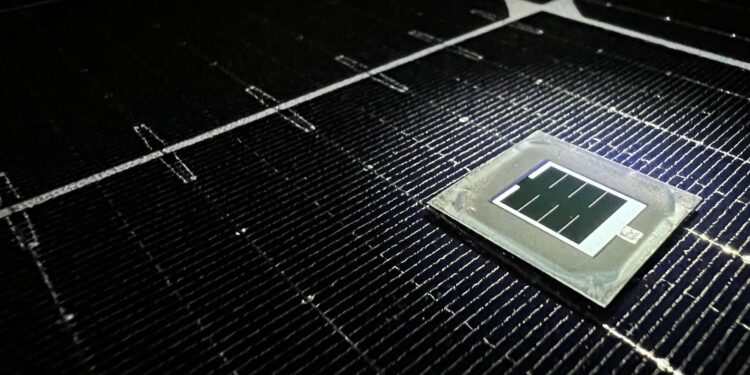A perovskite/silicon tandem solar cell. Credit: 2024 KAUST
Scientists have unveiled a roadmap to commercialize perovskite/silicon tandem solar cells, paving the way for a future powered by abundant, inexpensive clean energy in Saudi Arabia and the world.
The authors of the article, published in Science, include Professor Stefaan De Wolf and his research team from King Abdullah University of Science (KAUST) and the Technology Solar Center. The team is working to improve solar efficiency to achieve Saudi Arabia’s solar goals.
Perovskite/silicon tandem technology combines the strengths of two materials: the efficient light absorption of perovskite and the long-term stability of silicon to achieve record efficiency. In 2023, the De Wolf laboratory recorded two world records for power conversion efficiency, with five achieved globally in the same year, demonstrating the rapid progress of perovskite/silicon tandem technology.
However, translating lab success into real-world applications requires careful consideration. The document describes the main challenges and proposes solutions for commercialization.
Among these is taking into account real-world conditions, such as varying temperature and sunlight. The authors suggest geographic testing, similar to personalized medicine for solar cells, to optimize performance for specific locations.
Another consideration is accelerated stability testing. The deployed solar cells must have a lifespan of several decades. Therefore, tests that compress years of wear into a much shorter time frame are needed. Understanding degradation rates is crucial to setting competitive prices and warranties.
Finally, current manufacturing processes involve high material costs and potentially hazardous chemicals that may require costly safety precautions. The article proposes paradigms for monolithic and mechanically stacked tandem production lines to identify cost reduction opportunities.
“The market for perovskite/silicon tandems is expected to exceed $10 billion within ten years,” said Professor Stefaan De Wolf. “KAUST is at the forefront of this revolution, laying the foundation for clean energy that is affordable and accessible to all.”
Erkan Aydin, another author of the study, is expected to leave the De Wolf laboratory in 2024 to set up his own laboratory in Europe.
Groundbreaking research at KAUST on perovskite/silicon tandem photovoltaics illustrates the university’s commitment to developing green technologies that advance carbon-free policies and ensure a sustainable future.
More information:
Erkan Aydin et al, Pathways to commercial perovskite/silicon tandem photovoltaics, Science (2024). DOI: 10.1126/science.adh3849. www.science.org/doi/10.1126/science.adh3849
Provided by King Abdullah University of Science and Technology
Quote: Scientists unveil affordable solar cell project to power Saudi Arabia and beyond (January 11, 2024) retrieved January 11, 2024 from
This document is subject to copyright. Apart from fair use for private study or research purposes, no part may be reproduced without written permission. The content is provided for information only.



